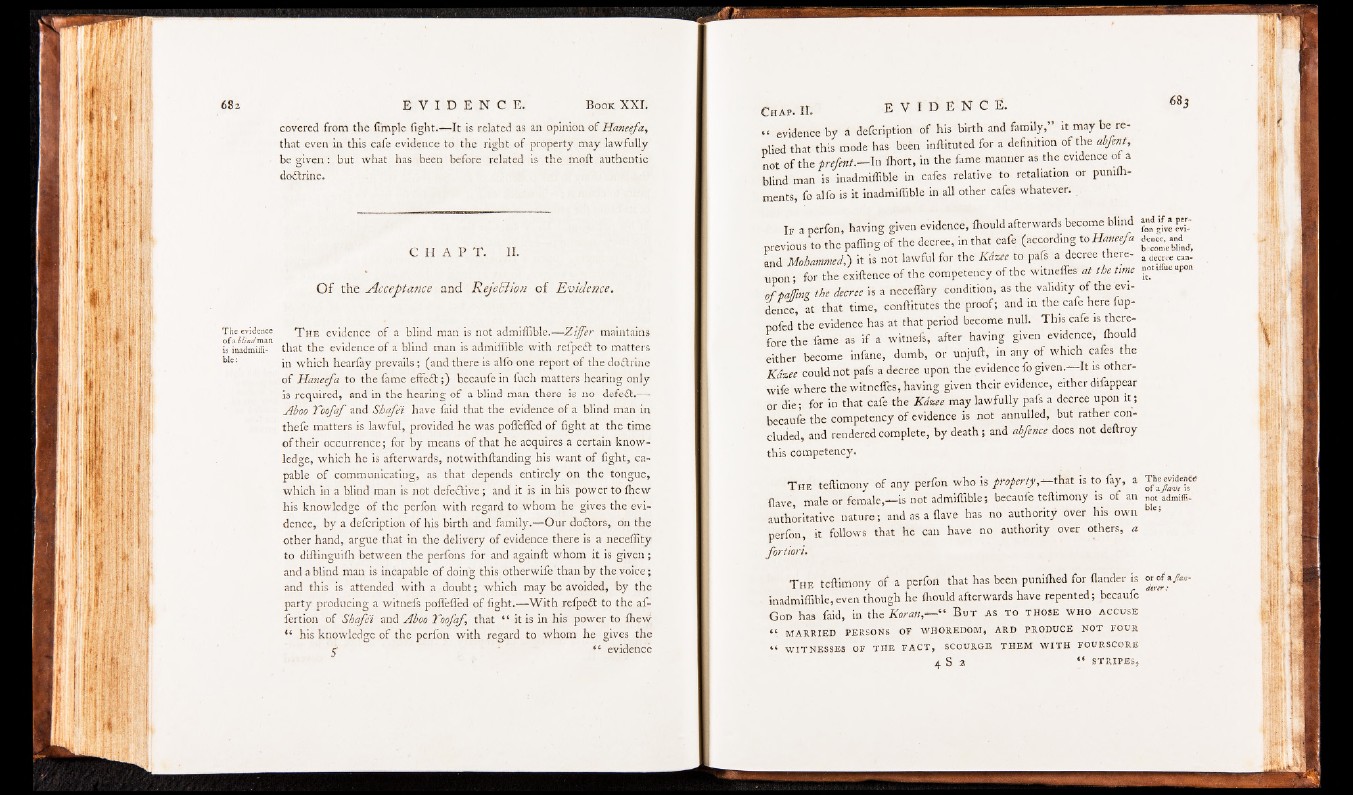
The evidence
o f a W/Wraan
is inadmiffi-
ble:
covered from the fi’mple fight.— It is related as an opinion of Haneefa,
that even in this cafe evidence to the right of property may lawfully
be given: but what has been before related is the mod authentic
dodtrine.
C H A P T . II.
Of the Acceptance and RejebJion of Evidence.
T he evidence of a blind man is not admiffible.— Zijfer maintains
that the evidence of a blind man is admiffible with refpeft to matters
in which hearfay prevails ; (and there is alfo one report of the doftrine
of Haneefa to the fame effefl ;) becaufe in fuch matters hearing only
is required, and in the hearing o f a blind man there is no defeft.—
Aboo Toofcf and Shcfei have faid that the evidence of a blind man in
thefe matters is lawful, provided he was polïèffed of fight at the time
of their occurrence ; for by means of that he acquires a certain knowledge,
which he is afterwards, notwithftanding his want of fight, capable
of communicating, as that depends entirely on the tongue,
which in a blind man is not defective ; and it is in his power to ffiew
his knowledge of the perfon with regard to whom he gives the evidence,
by a defcription of his birth and family.— Our doâors, on the
other hand, argue that in the delivery of evidence there is a neceffity
to diftinguiffi between the perfons for and againft whom it is given ;
and a blind man is incapable of doing this otherwife than by the voice ;
and this is attended with a doubt ; which may be avoided, by the
party producing a witnefs polîèfièd of fight.— With relpedt to the af-
fertion of Shafe'i and Aboo Toofaf, that “ it is in his power to ffiew
•j his knowledge of the perfon with regard to whom he gives the
w “ evidence
“ evidence by a defcription o f his birth and family,” it may be replied
that this mode has been inftituted for a definition o f the abfent,
not of the prefent.— In Ihort, in the fame manner as the evidence o f a
blind man is inadmiffible in cafes relative to retaliation or pumffi-
ments, fo alfo is it inadmiffible in all other cafes whatever.
If a perfon, having given evidence, ffiould afterwards become blind
previous to the palling of the decree, in that cafe (according to Haneefa
and Mohammed,) it is not lawful for the Kdzee to pafs a decree thereupon
• for the exiftence o f the competency of the witneffes at the time
ofpajling the decree is a neceflary condition, as the validity o f the evidence,
at that time, conftitutes the proof; and in the cafe here fup-
pofed the evidence has at that period become null. This cafe is therefore
the fame as i f a witnefs, after having given evidence, ffiould
either become infane, dumb, or unjuft, in any o f which cafes the
Kdzee could not pafs a decree upon the evidence fo given.— It is other-
wife where the witnefles, having given their evidence, either difappear
or die; for in that cafe the Kdzee may lawfully pafs a decree upon it;
becaufe the competency of evidence is not annulled, but rather concluded,
and rendered complete, by death; and abfence does not deftroy
this competency.
T h e teftimony o f any perfon who is property,^—that is to fay, a
Have, male or female,— is not admiffible; becaufe teftimony is o f an
authoritative nature; and as a Have has no authority over his own
perfon, it follows that he can have no authority over others, a
fortiori.
T he teftimony of a perfon that has been puniffied for {lander is
inadmiffible, even though he ffiould afterwards have repented; becaufe
G od has faid, in the K o r a n “ B ut as to those who accuse
m a r r ied Persons of whoredom, ard produce not four
“ W ITN E S S E S OF T H E F A C T , SCOURGE T H EM W IT H FOURSCO RE
4 S 2 “ S T R IP E S ,
and i f a per-
fon give evidence,
and
become blind,
a decree cannot
iffue upon
it.
The evidefi€d
o f aßa'üe is
not admiffi-
ble;
or o f a ßan
derer :